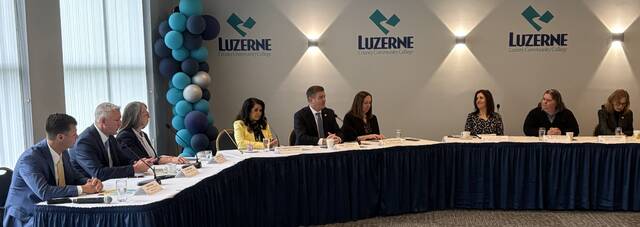College Sports
LCCC holds legislative forum on innovation through regional partnerships
Yudichak: College ‘is at the forefront of educational innovation in Pennsylvania’ NANTICOKE — Luzerne County Community College President John Yudichak on Wednesday said that in a world where educational accessibility and workforce development are more critical than ever, LCCC is setting a standard for higher education innovation and regional partnerships. “Luzerne County Community College […]

Yudichak: College ‘is at the forefront of educational innovation in Pennsylvania’
NANTICOKE — Luzerne County Community College President John Yudichak on Wednesday said that in a world where educational accessibility and workforce development are more critical than ever, LCCC is setting a standard for higher education innovation and regional partnerships.
“Luzerne County Community College is the largest, most popular, most accessible college in Northeastern Pennsylvania,” Yudichak said. “LCCC is at the forefront of educational innovation in Pennsylvania, establishing regional partnerships designed to enhance accessibility, affordability for our students and to address the workforce development demands of Northeastern Pennsylvania.”
On Wednesday, LCCC welcomed more than 80 attendees to its annual Commonwealth & County Legislative Breakfast, held at the Educational Conference Center on the Nanticoke campus.
This year’s theme — “Innovation through Regional Partnerships” — showcased LCCC’s leadership in developing community-centered solutions to regional challenges.
Atty. Catherine O’Donnell, LCCC Board of Trustees Chair, served as master of ceremonies.
“This breakfast is more than just a gathering; it’s a celebration of the partnerships we are forging to address vital challenges in our community,” Yudichak said. “With more than $13 million in annual support from the Commonwealth and $5.8 million from Luzerne County, we’re transforming those investments into high-impact programs that serve our students and our region.”
Yudichak said one of the most significant new educational partnerships comes through groundbreaking articulation agreements with the 10 universities in the Pennsylvania State System of Higher Education (PASSHE).
The program highlighted three major initiatives designed to drive educational innovation, workforce development and community recovery:
• Teach in NEPA Program
Launched at the LCCC Hazleton Center earlier this month, the Teach in NEPA Program is a partnership between LCCC, Commonwealth University, and the Hazleton Area School District.
Yudichak said the initiative offers a four-year pathway to a teaching degree for under $30,000 — making it one of the most affordable teacher training programs in Pennsylvania. He said the Wilkes-Barre Area School District has also expressed interest in joining the initiative, with plans to expand to LCCC’s Wilkes-Barre Center underway.
“We are thrilled to launch this new higher education model — Go here, graduate here, work here,” said Yudichak. “This is about building a pipeline of educators who live in and are committed to our communities.”
• AllOne Recovery Educational Institute (AREI)
Funded by the AllOne Foundation and recently awarded a $250,000 grant through the Luzerne County Opioid Misuse and Addiction Abatement Committee, Yudichak said the AREI supports students in recovery from substance use disorder with academic advising, peer mentoring, and workforce training.
With a 90% retention rate and an average GPA of 3.25, the program has become a model for collegiate recovery across the region.
“Our students in recovery deserve every opportunity to rebuild their lives through education,” said Dr. Graceann Platukus, vice president of enrollment management and student success. “This new funding allows us to expand services and help even more individuals succeed.”
• Microcredential Academy
In partnership with employers like Medico Construction Equipment, Dr. Russ Bigus, LCCC vice president of academic affairs, said LCCC’s Microcredential Academy delivers short-term, stackable certifications in high-demand fields such as IT, business, and skilled trades. These flexible, skills-focused courses provide a rapid pathway into the workforce or serve as a stepping stone to a degree.
“Microcredentials offer a direct response to employer needs,” said Bigus. “This is how we meet students where they are and prepare them for real opportunities.”
In his closing remarks, Yudichak reiterated LCCC’s commitment to accessibility and affordability.
“At $150 per credit, we are the most affordable college in the region,” Yudichak said. “With open admissions, anyone who wants to attend college can start their journey right here at LCCC. Community is at the heart of what we do.”
The LCCC Centers in Hazleton, Wilkes-Barre, Pittston, Scranton, Berwick, Shamokin and Watsontown serve as community hubs where students can access academic resources, financial aid assistance, and career advising.
Yudichak said LCCC’s localized approach to higher education breaks down transportation barriers and fosters a sense of belonging among students, significantly enhancing their chances of success.
With the support of a $250,000 grant from the Luzerne County Council and ongoing support from the AllOne Foundation, the institute has served nearly 250 students since its inception and produced impressive outcomes in recovery and educational attainment.
Luzerne County Manager Romilda Crocamo said she was pleased to be part of Wednesday’s panel to celebrate “the invaluable partnership” between Luzerne County Community College and the county.
“This collaboration embodies hope and opportunity, serving as a beacon for students and residents alike,” Crocamo said. “This stunning campus stands as a testament to our commitment to providing a nurturing and respectful environment for learners, fostering personal and professional growth. As a true gem in our community, Luzerne County Community College not only enriches the educational landscape, but also strengthens the bonds that connect us all. Together, we look forward to building a brighter future for every member of our community.”
Reach Bill O’Boyle at 570-991-6118 or on Twitter @TLBillOBoyle.